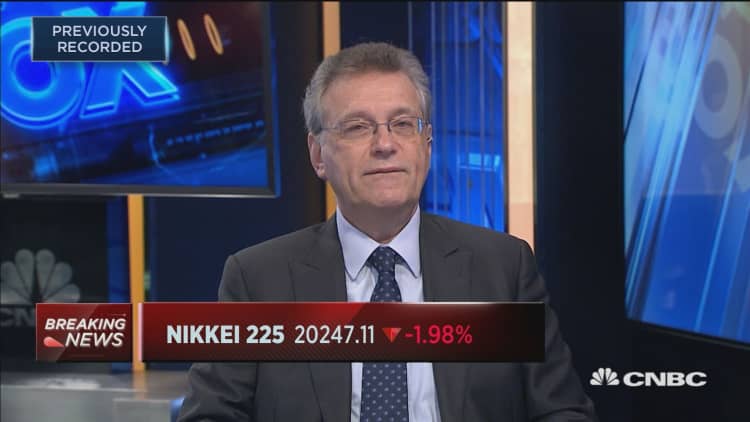
Fears are rising that a recession looms after a closely watched market metric flashed a warning signal, but one strategist told CNBC the supposed indicator "predicts absolutely nothing."
The yield on the 10-year U.S. Treasury briefly broke below the 2-year rate on Wednesday stateside. That so-called inverted yield curve has historically been regarded as a precursor to an economic recession. U.S. markets fell following the inversion, with the Dow Jones Industrial Average losing around 800 points. The rates inverted again in the morning of Asian trading hours on Thursday.
Nevertheless, Viktor Shvets, head of Asian strategy for Macquarie Commodities and Global Markets, brushed off those concerns.
"My view has always been that yield curve predicts absolutely nothing," he told CNBC's "Squawk Box" on Thursday.
"What it does tell you (is) that you will have a recession if you don't do something about it," Shvets added.
The yield curve inversion, he said, may demonstrate that the global economy is slowing down. That's because of a lack of liquidity, absence of reflationary momentum and a de-globalization of trade and capital flows, according to Shvets.
"If you reverse those elements, then the yield curve will respond very quickly," the strategist said, adding that, to him, "recession equals policy errors."
Central banks 'never run out of bullets'
Weighing in on concerns that central banks may not have enough fuel in their tanks to make their policy count, Shvets said that notion was "nonsense."
"It has to be made clear: Central banks never run out of bullets, ever," he said. "There are so many tools that central banks can bring to bear, (other than) just looking at interest rates."
Asked if he is worried that the markets and economy would become numb and weaken the impact of central bank action, Shvets had questions of his own.
"Would you rather have a deep recession? Would you rather have closures of factories? Would you rather have banks going down and people losing their deposits?" he asked. "If the answer you give me is 'no,' then there is no choice but to take various forms of drugs."
Taking the analogy further, he said: "One of the things we've been suggesting is that there are drugs that have lower side effects than monetary policy. And I think we need to brace those other drugs, not because they are fixing the problem, but because they are extending our life."
While fiscal responsibility and structural reforms are good ideas in theory, they almost never work in practice because "people are reluctant to embrace" them, Shvets added.
"What people would like to see is a perpetual growth machine. That's what we got used to, for the last 30, 40 years," he said. "To break away from that is almost impossible without really gut-wrenching adjustment."
Given the choice between resetting the system and finding new ways to extend growth, he said most would choose the less painful option.
"It just can't go on forever," he said. "But we can extend it for another decade or longer."
— CNBC's Thomas Franck and Eustance Huang contributed to this report.


